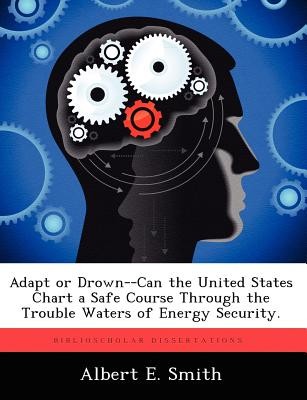
- We will send in 10–14 business days.
- Author: Albert E Smith
- Publisher: BiblioScholar
- ISBN-10: 1249357950
- ISBN-13: 9781249357957
- Format: 18.9 x 24.6 x 0.3 cm, softcover
- Language: English
- SAVE -10% with code: EXTRA
Adapt or Drown--Can the United States Chart a Safe Course Through the Trouble Waters of Energy Security. (e-book) (used book) | bookbook.eu
Reviews
Description
The United States ensures its national security with the world's most dominant military force. Its strong economy--currently the world's largest--provides the means for this dominance. Cheap oil has fueled the American economic infrastructure for decades--principally from imports of foreign oil. The base of this infrastructure has been the transportation system which consumes over 70 percent of the country's petroleum. Designed primarily around motor vehicles, it has enabled the movement of goods and people for the optimum benefit of the economy and shaped the American way of life. Now rapid industrialization of developing nations has increased demand for oil to a point where remaining excess capacity is relatively trivial. This has resulted in rising oil prices which threaten the continuing strength of the US economy and, in turn, its ability to maintain its national security. This vulnerability demonstrates the close link between US national defense, economic strength, and energy security. The US Energy Information Administration (EIA) asserts in its 2009 Energy Outlook that oil demand will rise by almost 20 percent by 2030. Oil prices will continue to rise as production is increased to meet demand, negatively impacting the United States' gross domestic product (GDP). The driving factors include the increasing costs of producing oil from existing oil fields at a constant rate and the higher costs associated with developing new oil fields. Given this scenario, action must be taken to decrease the direct effect oil has on the US economy. Only by starting now will the nation have sufficient time to overcome organizational inertia caused by naysayers and build the requisite infrastructure to make the goal of energy security through diversification both realistic and achievable. There is no single solution for solving the Energy Security dilemma in which the United States finds itself. Since it is made up of many different climate zones and has a large regional
varia
EXTRA 10 % discount with code: EXTRA
The promotion ends in 17d.11:53:44
The discount code is valid when purchasing from 10 €. Discounts do not stack.
- Author: Albert E Smith
- Publisher: BiblioScholar
- ISBN-10: 1249357950
- ISBN-13: 9781249357957
- Format: 18.9 x 24.6 x 0.3 cm, softcover
- Language: English English
The United States ensures its national security with the world's most dominant military force. Its strong economy--currently the world's largest--provides the means for this dominance. Cheap oil has fueled the American economic infrastructure for decades--principally from imports of foreign oil. The base of this infrastructure has been the transportation system which consumes over 70 percent of the country's petroleum. Designed primarily around motor vehicles, it has enabled the movement of goods and people for the optimum benefit of the economy and shaped the American way of life. Now rapid industrialization of developing nations has increased demand for oil to a point where remaining excess capacity is relatively trivial. This has resulted in rising oil prices which threaten the continuing strength of the US economy and, in turn, its ability to maintain its national security. This vulnerability demonstrates the close link between US national defense, economic strength, and energy security. The US Energy Information Administration (EIA) asserts in its 2009 Energy Outlook that oil demand will rise by almost 20 percent by 2030. Oil prices will continue to rise as production is increased to meet demand, negatively impacting the United States' gross domestic product (GDP). The driving factors include the increasing costs of producing oil from existing oil fields at a constant rate and the higher costs associated with developing new oil fields. Given this scenario, action must be taken to decrease the direct effect oil has on the US economy. Only by starting now will the nation have sufficient time to overcome organizational inertia caused by naysayers and build the requisite infrastructure to make the goal of energy security through diversification both realistic and achievable. There is no single solution for solving the Energy Security dilemma in which the United States finds itself. Since it is made up of many different climate zones and has a large regional
varia


Reviews